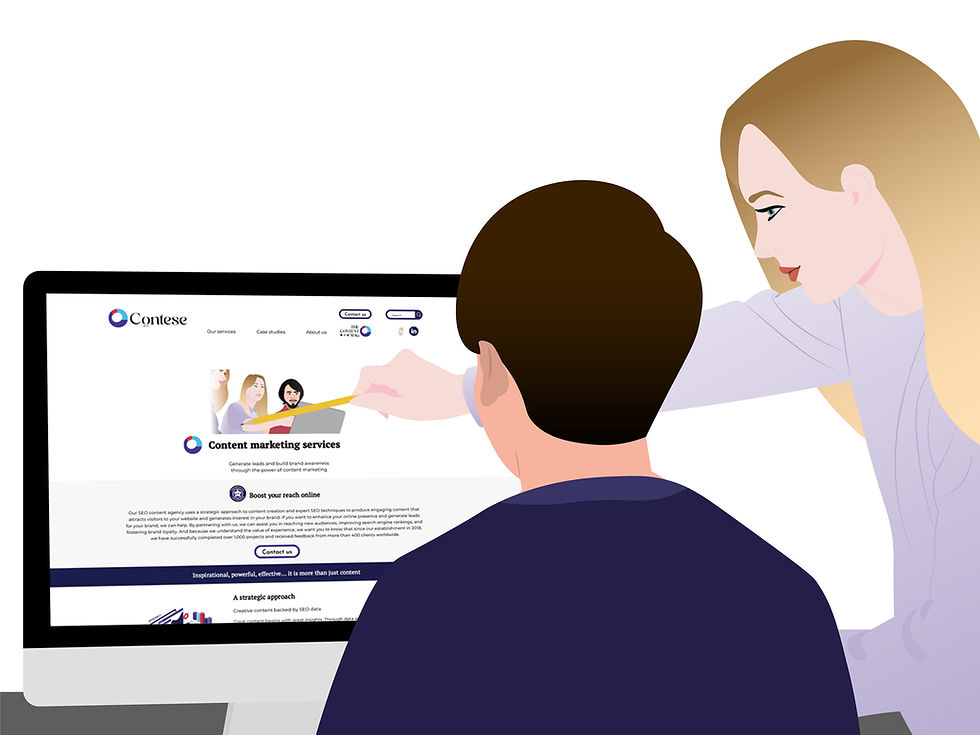What content do you need for each phase of your sales funnel?
- Contese writers

- Aug 26, 2024
- 4 min read

Your sales funnel represents the journey your customers make, from the moment they come into contact with your brand to the moment they decide to jump onboard.
Each checkpoint of the journey needs careful consideration, with a clear strategy that focuses on the perspective of your customers at every stage.
The best sales funnel content is tailored to specific pain points, curated to captivate your customer and compel them to continue to the next phase of the journey.
What are sales funnels?

They are essentially a visual representation of your customer journey, which can be broken down into distinct stages. While the number of stages varies depending on the unique nature of your company and sector, sales funnels are generally split into three: the top of the funnel (TOFU), the middle (MOFU), and the bottom (BOFU).
The TOFU is the point of initial contact. This is the ‘awareness and interest’ phase, representing the moment when a customer’s interest is piqued – they like what they see, and they want to find out more.
The MOFU is represented by ‘evaluation, negotiation and decision’. At this stage, your customer gets to know your products and services a little better, and begins to form a decision.
Finally, the BOFU stage of the funnel is ‘sale and renewal’. The user has made a purchase, ready to commit to becoming a loyal customer and to spread the word about how great your brand is.
What to create for the top of the funnel (TOFU)
Content for sales funnels at the TOFU stage isn’t designed to sell from the get-go. Instead, it educates and informs, answering common questions and addressing pain points. Here, you establish trust in your brand as a useful source of information and an authority in a particular area.
There are several content types that are particularly useful for this. Blog posts are a fantastic source of content. They introduce your brand voice and can mix evergreen, informative pieces with on-trend topics that captivate your core audience.
Infographics and videos provide valuable visual content, while white papers and research studies allow you to delve a little deeper. Educational videos serve a similar purpose – they provide the audience with valuable information, without the hint of a transaction.
Native advertising posts, presentations, and generic social media posts also all contribute to your top-of-the-funnel content. It’s about catching that initial attention and introducing your brand, all the while avoiding getting into specifics.
What to create for the middle of the funnel (MOFU)
Moving beyond the initial awareness stage, your prospective customers are now seriously considering your product or service. The MOFU stage is about strengthening your relationship with your audience before guiding them to a sales conversion.
For this stage of the sales funnel, consistency is key. Email drip campaigns build an organic relationship with the customer. Moreover, customer reviews are crucial, as they serve to showcase your brand reputation and sow the seeds of a trusting relationship with your ever-expanding customer base.
Comparisons, case studies, and informative webinars are all useful, as are how-to guides that directly refer to your brand’s products or services. These all help your customer base learn more about your brand’s value while positioning you as a thought leader.
All of this content should be easily accessible on your website. That way, your customers can pass through the MOFU stage with a few simple clicks.
What to create for the bottom of the funnel (BOFU)
This is the stage where your customer is ready to make a purchase. The main objective at this stage is to demonstrate the direct value of your product or service. This is when your content is free to become a little more creative and sales-focused.
The most effective BOFU sales funnel content includes product demos, case studies demonstrating successful outcomes, testimonials from other customers, and focused personalised email campaigns. The goal is to gain the confidence of your customers and convince them to take action.
Free trials are effective in this ‘decision and action stage’. Give your prospective customers an opportunity to gain first-hand experience of your product or service, then follow up with promotional efforts and discounts to sweeten the deal.
A University of Washington study found that a seven-day trial period is optimal when it comes to maximising customer acquisition, retention, and profitability. Just over 15 per cent of all subjects in the study committed to a subscription following the conclusion of the seven-day trial.
How to bring each sales funnel stage together

At each stage of the funnel, there will be some crossover in the type of content that you use. This is completely normal, and every sales funnel is different depending on the sector or industry you’re in, what you’re offering and who you want to attract. Bridging the gaps between the stages is key and, to avoid customers slipping through, it’s important to consider their journey as a whole, creating content to accompany them at every step of the way.
The content you make at each stage of the funnel requires a different approach and writing style for success. Still, the content needs to be integrated in a consistent, seamless way to effectively showcase your brand and drive up those conversion rates.
When you work with the creative copywriter team at Contese Agency, you’re putting your sales funnel content strategy in the hands of experts. Our team of experienced creative content writers and digital marketing specialists know exactly what’s needed at each stage of the sales funnel, and will work with you to transform your brand and build new connections with your audience.




